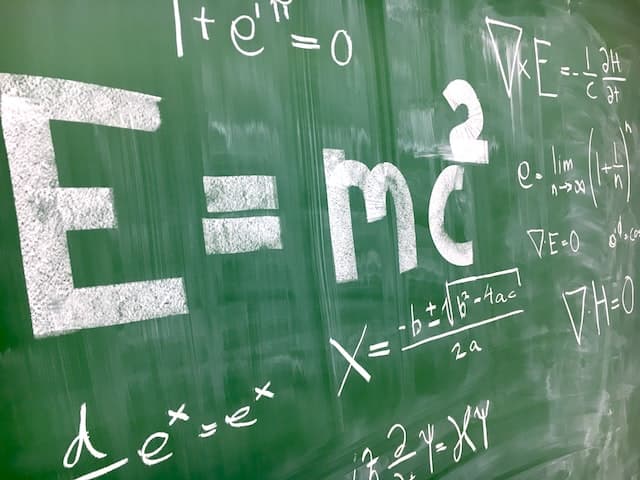Physics is one of the most challenging branches of science, making any set of physics quiz questions an instant challenge. So why not test your knowledge on the topic? Or better yet, see how much your friend might know about all things relating to classical physics, quantum physics, and more. Try out this physics trivia challenge.
Physics Trivia
Here are some physics trivia and ideas that you might have not known.
- White light contains all the colors in the visible spectrum.
- Acceleration directed opposite direction of a certain motion is called negative acceleration.
- Electric current has three effects, namely heating, magnetic, and chemical.
- The SI unit of electrical resistance is called ohm (Ω).
- The Kelvin measure of temperature measures kinetic energy caused by the physical phenomena of rising and falling temperature.
- The English physicist Stephen Hawkings suffered from ALS or Amyotrophic Lateral Sclerosis.
Physics Trivia Questions and Answers
Are you ready for the ultimate physics trivia quiz? Try out the physics trivia questions below and see how many you can answer right.
Click on the blurred area to reveal the answer.
Test it out. Click here to reveal the answer 👉 Awesome! You’re ready
| Questions | Answers |
|---|---|
| Schrödinger’s cat is a thought experiment dealing with which type of mechanics? | ▶ Quantum Mechanics |
| What do you call the force moving away from an axis in a rotational motion? | ▶ Centrifugal Force |
| What’s a vector field of magnetic influence on moving electric charges, currents, and magnetic materials? | ▶ Magnetic Field |
| Which British physicist discovered the existence of electrons? | ▶ J. J. Thomson |
| Who are the two quantum physics who fathered Quantum physics? | ▶ Niels Bohr and Max Planck |
| Who won the Nobel Prize in Physics back in 1965 aside from Julian Schwinger and Sin-Itiro Tomonaga? | ▶ Richard Feynman |
| What law explains the three basic laws of mechanics? | ▶ Newton’s Law |
| What study looks at the theoretical behaviors of subatomic particles? | ▶ Quantum Theory |
| What do you call a nuclear reaction where subatomic particles fuse together? | ▶ Nuclear Fusion |
| What do you call a nuclear reaction where a subatomic particle splits into different pieces? | ▶ Nuclear Fission |
| According to physics, what are the four fundamental forces in nature? | ▶ Strong Force, Electromagnetic Force, Weak Force, Gravitational Force |
| Which branch of physics is devoted to the study of heat and related phenomena? | ▶ Thermodynamics |
| Who came up with the theories of General and Special relativity? | ▶ Albert Einstein |
| 186,282 miles per second is the speed of what in a vacuum? | ▶ Light |
| A young Isaac Newton is said to have been hit on the head by which fruit, leading him to come up with the theory of gravity? | ▶ An apple |
| Who is the author of the book “A Brief History of Time”? | ▶ Stephen Hawking |
| What is the smallest particle of an element that retains its chemical properties called? | ▶ Atom |
| What is the equation for calculating work? | ▶ Work = force x distance |
| What law states that for every action, there is an equal and opposite reaction? | ▶ Newton’s third law |
| What is the measure of an object’s resistance to changes in its rotational motion called? | ▶ Moment of inertia |
| What is the bending of light as it passes from one medium to another called? | ▶ Refraction |
| What is the process of splitting an atom called? | ▶ Nuclear fission |
| What term is used to describe the amount of matter in an object? | ▶ Mass |
| What type of electromagnetic radiation has the highest energy? | ▶ Gamma rays |
| What is the equation for calculating acceleration? | ▶ Acceleration = (final velocity – initial velocity) / time |
| What is the speed of light in a vacuum? | ▶ 299,792,458 meters per second |
| What is the property of matter that determines the strength of the gravitational attraction between two objects called? | ▶ Mass |
| What is the equation for calculating force? | ▶ Force = mass x acceleration |
| What is the law of conservation of energy? | ▶ Energy cannot be created or destroyed, only transferred or transformed |
| What is the unit of measure for electric current? | ▶ Ampere |
| What is the force that opposes the relative motion of two surfaces in contact called? | ▶ Friction |
| What is the property of matter that determines the amount of space an object occupies called? | ▶ Volume |
| What is the equation for calculating the force of gravity between two objects? | ▶ F = G x (m1 x m2) / d^2 |
| What is the term for the point where all the mass of an object is concentrated? | ▶ Center of mass |
| What type of energy is stored in an object due to its position or shape? | ▶ Potential energy |
| What law states that the total entropy of an isolated system always increases over time? | ▶ Second law of thermodynamics |
| What is the smallest particle in the universe? | ▶ Quark |
| What is the term for the rate at which velocity changes over time? | ▶ Acceleration |
| What is the process by which an atom releases energy in the form of particles or waves? | ▶ Radioactivity |
| What is the force that opposes motion between two surfaces that are in contact with each other? | ▶ Friction |
| What is the energy that an object possesses due to its motion called? | ▶ Kinetic energy |
| What type of wave has particles that vibrate perpendicular to the direction of wave propagation? | ▶ Transverse wave |
| What type of wave has particles that vibrate parallel to the direction of wave propagation? | ▶ Longitudinal wave |
| What is the term for the number of waves that pass a fixed point per unit time? | ▶ Frequency |
| What is the term for the total energy of an object due to its motion and position? | ▶ Mechanical energy |
| What type of lens is thicker at the center than at the edges and causes parallel rays of light to converge? | ▶ Convex lens |
| What is the term for the angle between the incident ray and the normal line of a surface? | ▶ Angle of incidence |
| What is the term for the ability of a material to conduct electricity? | ▶ Electrical conductivity |
| What is the term for the force that an object exerts on a surface that is perpendicular to the object’s weight? | ▶ Normal force |
| What is the unit of power? | ▶ Watt |
| What is the term for the force that opposes the motion of an object through a fluid? | ▶ Drag force |
| What type of mirror curves inward like the inside of a spoon and causes parallel rays of light to converge? | ▶ Concave mirror |
| What is the term for the change in frequency of a wave due to the motion of the source or the observer? | ▶ Doppler effect |
| What is the property of matter that resists changes in its motion called? | ▶ Inertia |
| What is the term for the energy that an object possesses due to its position or configuration? | ▶ Potential energy |
| What is the force that holds the nucleus of an atom together called? | ▶ Strong nuclear force |
| What is the unit of resistance? | ▶ Ohm |
| Which type of radiation has the highest energy? | ▶ Gamma radiation |
| What type of energy is stored in an object that is lifted off the ground? | ▶ Gravitational potential energy |
| What is the speed of light in a vacuum? | ▶ 299,792,458 meters per second |
| What is the phenomenon that occurs when a wave bounces off a surface? | ▶ Reflection |
| Which law states that for every action, there is an equal and opposite reaction? | ▶ Newton’s third law of motion |
| What is the force that opposes motion between two surfaces in contact? | ▶ Friction |
| What is the measure of an object’s resistance to a change in its state of motion? | ▶ Inertia |
| What is the term for the pressure exerted by a fluid on an object submerged in it? | ▶ Buoyant force |
| What is the term for the force per unit area exerted by a fluid on a surface in contact with it? | ▶ Fluid pressure |
| What is the unit of electric charge? | ▶ Coulomb |
| What is the term for the property of a material that allows it to be magnetized? | ▶ Magnetic susceptibility |
| What type of energy is associated with the motion of an object? | ▶ Kinetic energy |
| What type of energy is associated with the position of an object relative to other objects? | ▶ Potential energy |
| What is the unit of force in the International System of Units (SI)? | ▶ Newton (N) |
| What is the process by which an atom or molecule acquires a negative or positive charge? | ▶ Ionization |
| What is the speed of light in a vacuum? | ▶ 299,792,458 meters per second |
| What is the property of matter that resists changes in motion called? | ▶ Inertia |
| What is the transfer of heat between objects that are in direct contact with each other? | ▶ Conduction |
| What is the force that opposes motion between two surfaces that are in contact? | ▶ Friction |
| What is the process by which a solid changes directly into a gas without passing through the liquid state called? | ▶ Sublimation |
| What is the process by which a gas changes directly into a solid without passing through the liquid state called? | ▶ Deposition |
| What is the temperature at which a substance changes from a liquid to a gas at its vapor pressure called? | ▶ Boiling point |
| What is the temperature at which a substance changes from a solid to a liquid called? | ▶ Melting point |
| What is the bending of light as it passes through a medium with a different refractive index? | ▶ Refraction |
| What is the emission of electrons from a metal surface when light falls on it called? | ▶ Photoelectric effect |
| What is the process by which an atom emits radiation as a result of a transition from a higher energy level to a lower one? | ▶ Emission |
| What is the process by which an atom absorbs radiation and moves to a higher energy level? | ▶ Absorption |
| What is the bending of waves around an obstacle or through an opening? | ▶ Diffraction |
| What is the principle that energy cannot be created or destroyed, only transformed or transferred? | ▶ Law of Conservation of Energy |
| What is the energy stored in an object due to its position or shape? | ▶ Potential energy |
| What is the energy of motion called? | ▶ Kinetic energy |
| What is the process by which a gas changes to a liquid called? | ▶ Condensation |
| What is the name for a material that does not allow heat or electricity to pass through it easily? | ▶ Insulator |
| What is the name of the phenomenon where light waves change direction as they pass through a medium? | ▶ Refraction |
| What is the name for the amount of matter in an object? | ▶ Mass |
| What is the name of the process by which heat is transferred through direct contact between materials? | ▶ Conduction |
| What is the name of the type of energy that an object possesses due to its motion? | ▶ Kinetic energy |
| What is the name of the process by which heat is transferred through the movement of a fluid or gas? | ▶ Convection |
| What is the name of the subatomic particle that has a positive charge? | ▶ Proton |
| What is the name of the device used to measure electric current? | ▶ Ammeter |
| What is the name of the phenomenon where an object in motion tends to stay in motion and an object at rest tends to stay at rest? | ▶ Newton’s first law of motion |
| What is the name of the type of energy that is stored in an object due to its position or configuration? | ▶ Potential energy |
| What is the name of the law that states that for every action, there is an equal and opposite reaction? | ▶ Newton’s third law of motion |
| What is the name of the type of energy that is stored in the nucleus of an atom? | ▶ Nuclear energy |
| What is the name of the type of wave that does not require a medium to travel through? | ▶ Electromagnetic wave |
About the Author
Tim majored in Humanities with a bachelor in English and Theatre at New York State University. He lectured on entertainment business studies for three years at Plymouth College.
Tim has been a trivia host in his current hometown of Pittsburgh for the past two years. He enjoys hanging out with people who love trivia just as much as he does.
His friends call him the Question Master.













